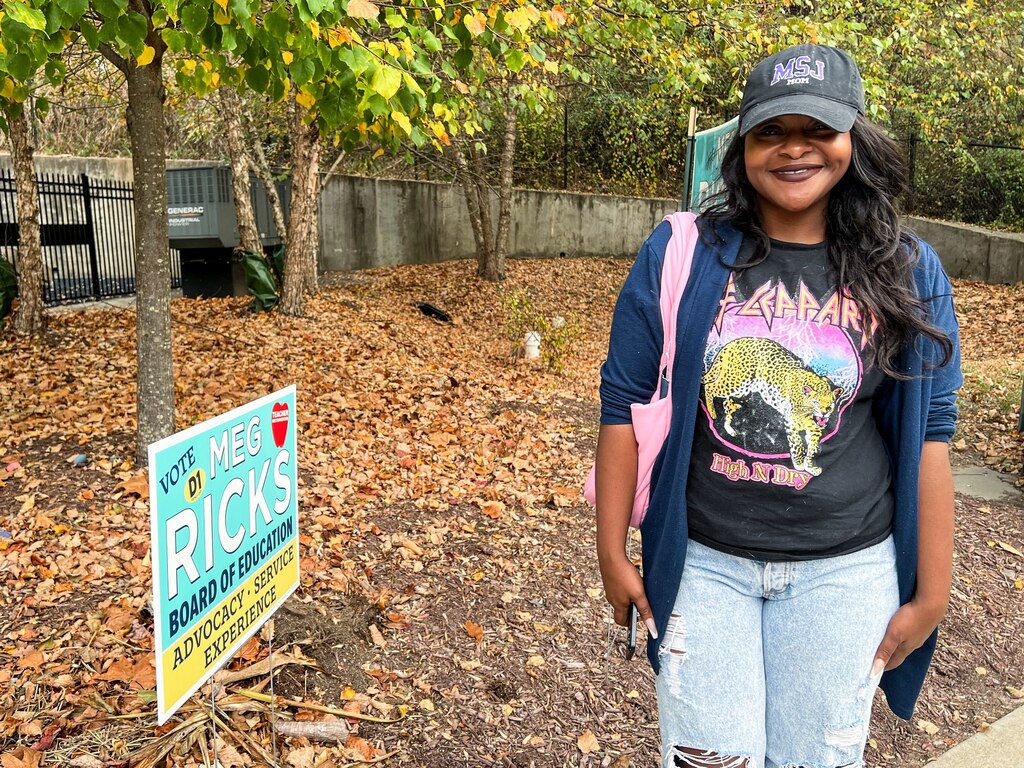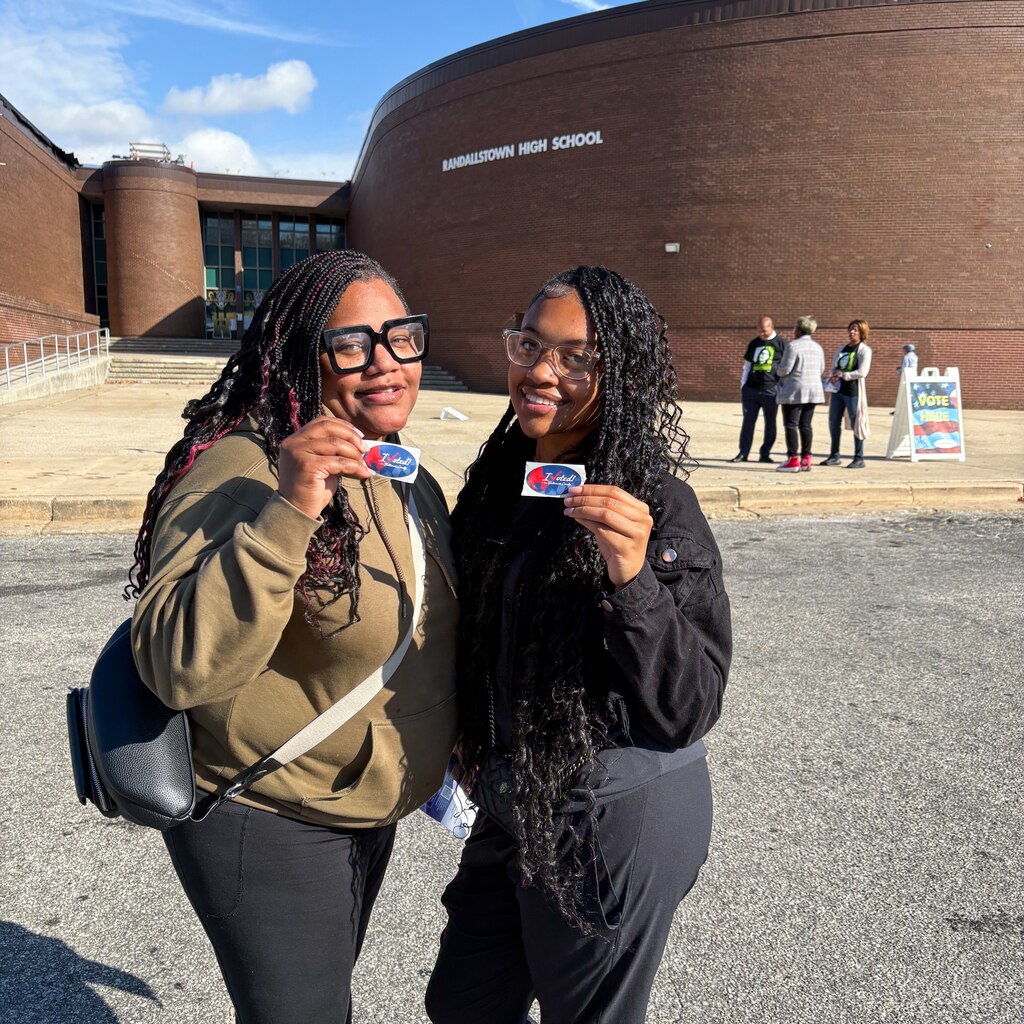Voters overwhelmingly approved a ballot measure to solidify reproductive rights in Maryland’s constitution, an expected result in a state where polling has shown large majorities support legal abortion.
With 80% of the votes counted at midnight, nearly three-quarters approved the measure.
Abortion was already legal in Maryland until fetal viability and faced no immediate threat. But lawmakers voted last year to place the measure on the ballot as extra protection after the U.S. Supreme Court stripped the constitutional right to abortion in its 2022 decision.
Maryland was one of 10 states with a fall ballot measure. Seven other measures already passed in their states, led by both Democrats and Republicans.
Democrats currently hold a supermajority in the Maryland General Assembly, but supporters of the ballot measure, Question 1, say solidifying abortion into the constitution would make it far more difficult for future legislatures to enact restrictions.
Erin Bradley, chair of the ballot committee supporting the amendment, said after the amendment passed that Maryland voter chose “to protect their health and their futures.”
Read More
She added, “The strong protection of reproductive rights that has existed for decades in Maryland law is now ironclad, enshrined in the state constitution. Voters have guaranteed reproductive certainty amid uncertain times.”
House of Delegates Speaker Adrienne A. Jones, whose legislation put the constitutional amendment on the ballot, thanked voters for supporting the measure but vowed in a statement that “this fight is not over!””It won’t be over until EVERY woman in EVERY state has the same access to the reproductive care they need to stay healthy & safe,” Jones, a Democrat, wrote on social media.
The passage of the amendment represents the culmination of years’ of work that dates back to the late Speaker Michael E. Busch, who championed it before his death in 2019.
Several voters who lined up early Tuesday in Ellicott City said reproductive rights were top of mind.

Brittany Brown, 36, said she found herself crying inside the voting booth and tearing up while recounting her experience. As a Black, single mother and a public school teacher, she said, it was important for her to vote, “especially as women, with our reproductive rights being stripped from us.”
Brown voted yes on the state’s proposed amendment to enshrine abortion in the state constitution and said she knows at least five friends who haven’t voted in the past but felt it was imperative to cast a ballot this year. She also said having a woman as president would be a “breath of fresh air.”
Others listed abortion as one of several important ballot items.
Morgan Walters, an 18-year-old Bowie State University student, came home to Randallstown to join her mother as the pair voted for Democratic presidential nominee Kamala Harris and Democratic Senate candidate Angela Alsobrooks. She said the choice wasn’t hard.
“Project 2025. Reproductive freedom. Being able to choose what I want to do with my own body,” she said, while her mother, Monica Walters, added that she was excited to vote with her daughter for two strong Black women.

For others, the abortion issue wasn’t so simple.
”One of my biggest struggles the whole election is being a Christian and knowing what to pick,” said Meagan Stachurski, 35 and a registered Republican, as she voted at Hampstead Hill Elementary in Canton.
She sees the sanctity of life, but also recently almost lost a friend to an ectopic pregnancy.
“I will always choose a baby for myself, but I never want to make the choice for someone else,” she said. “I will be forgiven for that. That’s how I view it.”
In Maryland, the state legislature had already made other changes in support of reproductive rights. It has required public and private insurance to cover abortions; shielded providers who perform abortions for out-of-state residents; required universities to provide reproductive health care; provided security at abortion clinics; and allowed medical providers other than doctors to perform abortions.
Supporters have also been seeking more funding to support abortion access, as more women come to Maryland from states where it is now restricted.
Critics of the ballot measure sought to portray it as a threat to parental rights. One group formed in opposition, Health Not Harm, said it would allow children to permanently alter their bodies, including with gender-affirming care, without a parent or guardian’s permission.
“Deception won in Maryland on November 5 when the Reproductive Freedom Amendment passed,” said Deborah Brocato, the group’s chairperson. “Freedom is neither stripping parents of their rights nor is it tricking citizens into voting yes on a deceptive amendment. The amendment language is deliberately broad so that many issues are enshrined in the Maryland Constitution, including reproductive freedom for children.”
She added: “Children now have the right to consent to gender drugs and surgeries without parental consent or knowledge. Parents lose authority for their children’s healthcare and education decisions when it comes to anything considered reproductive freedom, a term that is still undefined.”
Supporters dispute this and say the measure broadly covers abortion, birth control and infertility treatment. But the idea resonated with some people.
Cathy Klingler, a 72-year-old Gambrills woman representing Health Not Harm, made a pitch against Question 1 to 55-year-old Tracy DeVore of Odenton as she walked toward Waugh Chapel Elementary School to cast her ballot.
DeVore said she probably would have left Question 1 blank, but Klingler’s advocacy “definitely influenced” her ultimate decision to vote against it.
”I am not for abortion, but I don’t think the government should be telling people what to do or making moral decisions for them — to an extent,” DeVore said. “I don’t agree with late-term abortion, and I don’t agree with sex change.”
It’s not clear, however, if anything will change with the ballot measure’s passage. Parents already have to be notified if their child is under age 18 and seeks an abortion, but doctors can waive the requirement under certain circumstances if they believe the minor is mature enough to make the decision, may be subject to harm or if a caregiver can’t be located.
A late-September survey by the University of Maryland, Baltimore County’s Institute of Politics found 69% backed the measure, 21% were opposed and 9% were undecided.
Democrats in the state were hoping the deep support would drive more people to vote, as the level of support in the polls outperformed support for Harris and Alsobrooks, who both made reproductive rights a major campaign focus against Republican opponents.
Banner reporters Maya Lora, Rona Kobell and Cayla Harris contributed to this article.




Comments
Welcome to The Banner's subscriber-only commenting community. Please review our community guidelines.